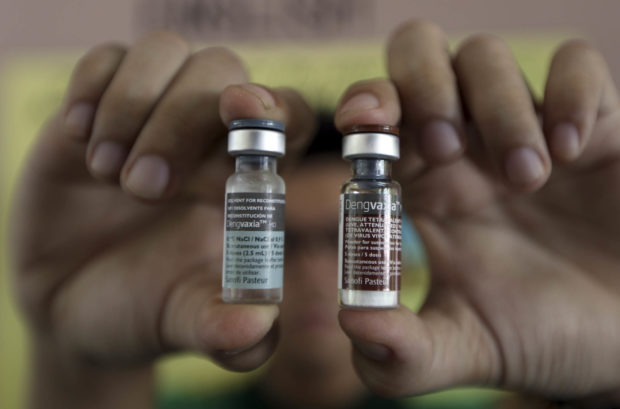
Pupils of Parang Elementary School in Marikina City, April 4, 2016, receive the world’s first dengue vaccine, which officials hope would lessen children’s susceptibility to the deadly mosquito-borne disease. INQUIRER PHOTO / NINO JESUS ORBETA
Officials are poised to investigate the botched P3.5-billion antidengue vaccination drive that was suspended by the Department of Health (DOH) following a disclosure by the manufacturer of the vaccine that it could cause serious harm.
Sen. Joseph Victor Ejercito, chair of the Senate health committee, on Saturday said that he would open an inquiry into the immunization program after health authorities finished their own investigation of the dangers posed by the first such vaccine in the world.
Health Secretary Francisco Duque III announced the suspension of the program on Friday, two days after the manufacturer of Dengvaxia vaccine, French pharmaceutical giant Sanofi Pasteur, said that it could worsen the effects of the disease on those who have not been exposed to the dengue virus.
Duque said experts from the World Health Organization (WHO) were scheduled to discuss Sanofi’s disclosure later this month.
Joint hearing
In a text message to the Inquirer, Ejercito said there would most likely be “a joint hearing with the blue ribbon committee since this issue concerns accountability.”
“But we have to let the DOH and WHO experts do their investigation and research first since they know better,” he said.
He said that “January will be the right time perhaps” to start the hearings on what he had earlier called “disturbing findings” on the vaccine.
More than 733,000 children aged 9 years old and above have received the first of three Dengvaxia shots in the first dengue mass immunization program in the world. Authorities do not know how many of those vaccinated had previously been exposed to the dengue virus.
Ejercito said those found liable in the mass vaccination program would be “held accountable.”
“Not only is it now a procurement issue but the health of 700,000 kids is also in danger,” he said.
Dante Jimenez, founder of Volunteers Against Crime and Corruption (VACC), said his group would ask the Department of Justice to order the National Bureau of Investigation to investigate the government’s purchase of Dengvaxia.
“We would file a complaint against those who initiated this project,” Jimenez told reporters.
Several medical experts had opposed the “hasty” implementation of the immunization program and for not waiting for the results or more tests and safeguards.
The suspension of the vaccination drive and Sanofi’s statement have worried and angered parents, particularly those whose children have not had dengue.
‘Guinea pigs’
Some government schoolteachers who were mobilized for the program, which mainly targets children aged 9 to 14 years old, also resented being instrumental in turning their students into “guinea pigs.”
“We expect the worried and angry parents of students who were already vaccinated to troop to the school and berate us because we were the ones who assured them that their children are safe,” said one public schoolteacher in Lucena City in Quezon province.
She said many students and their parents were against the vaccination but she and other teachers convinced them to be immunized.
“And because they trusted us, they allowed the vaccination. But now, that trust has been compromised,” she said.
One of her fellow teachers said the Department of Education should not allow the DOH to embark on an immunization drive “if they are not sure of the safety of the medicines.”
“Our students are not experimental subjects,” the teacher told the Inquirer.
Both teachers requested anonymity for fear of reprimands from their superiors.
Sen. Nancy Binay, a member of the Senate health committee, urged the DOH and Sanofi to launch a nationwide medical advisory and information drive to reach out to parents whose children have received the vaccine.
She also asked the DOH to establish a public health surveillance system to avoid a medical disaster.
Sen. Win Gatchalian proposed that the DOH tap local governments to help ease the worries of parents.
He said his home city of Valenzuela was addressing concerns of the families of 15,538 children who had been vaccinated. “This is helping parents [in the city] rest a little easier,” Gatchalian said.
Dr. Benjamin Co, director of the Center for Drug Regulation and Research, said Dengvaxia would not be pulled out of the market but Sanofi would have to revise the product information ticket that accompanies the vaccine before its sale is allowed.
“They will have to change how and what it is used for. The drug will be the same but the drug information will have to be changed,” he said.
The change in the label must contain the instructions for using the vaccine, the indication, or what it is for, and the recommended dosage, Co said. —With reports from Jhesset M. Enano, Julie M. Aurelio and Delfin T. Mallari Jr.